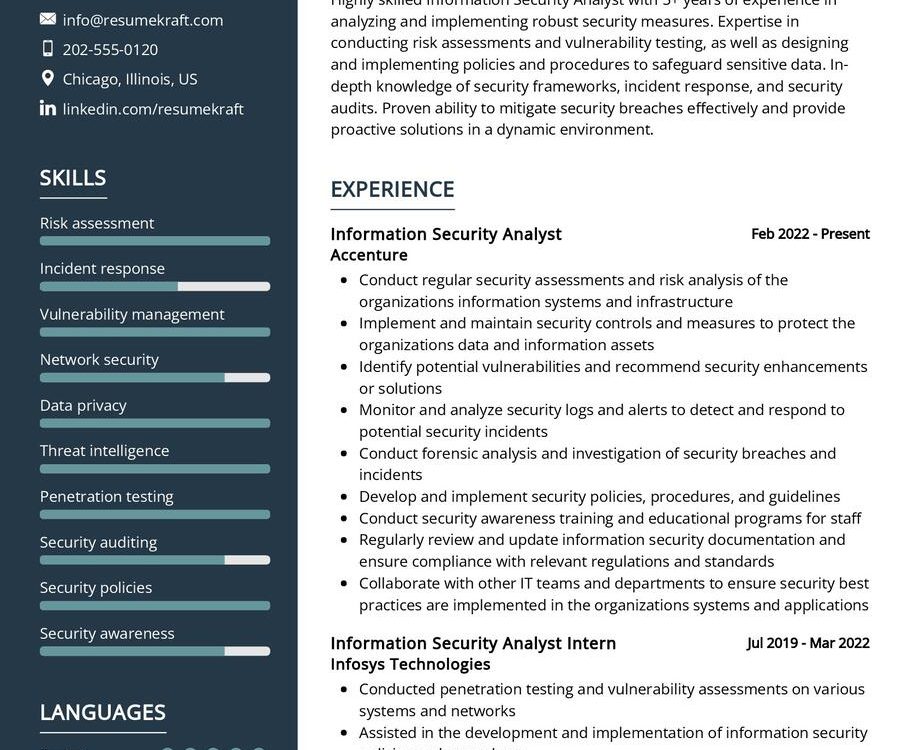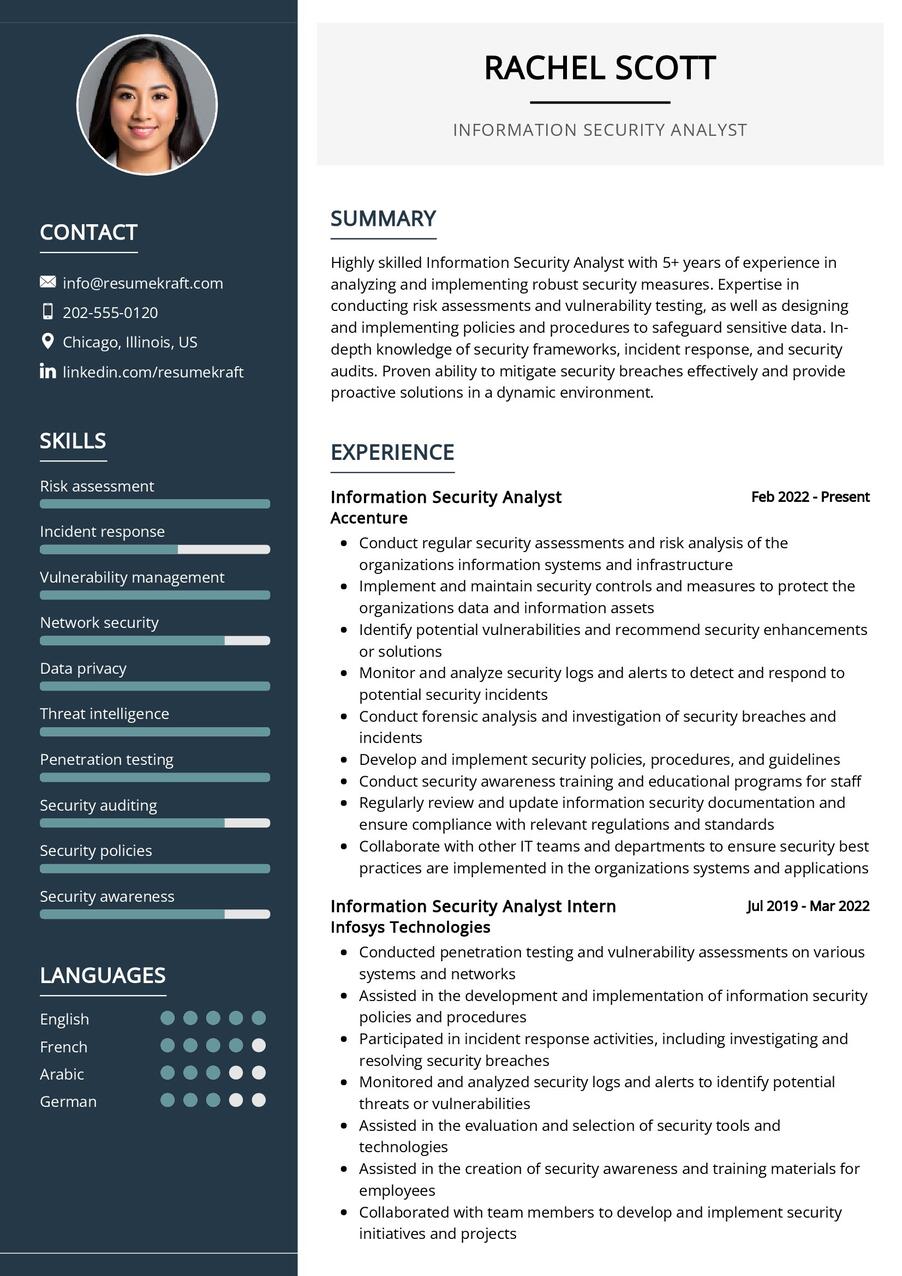Understanding the Role of an Information Security Analyst
The Information Security Analyst plays a crucial role in safeguarding an organization’s digital assets and ensuring the confidentiality, integrity, and availability of sensitive information. In an era of increasing cyber threats, the responsibilities of an Information Security Analyst are paramount. This article delves into the multifaceted role of an Information Security Analyst, exploring the skills, qualifications, and key responsibilities that define this position.
Requirements for an Information Security Analyst Role
Becoming an Information Security Analyst requires meeting specific educational and professional criteria. Let’s explore the essential qualifications and skills needed to excel in this role:
- A Bachelor’s or Master’s degree in Cybersecurity, Information Technology, or a related field, showcasing a solid foundation in the realm of digital security.
- Extensive knowledge of cybersecurity frameworks, including but not limited to NIST, ISO 27001, and CIS Controls.
- Hands-on experience in conducting risk assessments, vulnerability assessments, and penetration testing.
- Proficiency in security tools such as SIEM (Security Information and Event Management), IDS/IPS (Intrusion Detection System/Intrusion Prevention System), and antivirus solutions.
- Excellent analytical and problem-solving skills, with the ability to respond effectively to security incidents.
- Up-to-date knowledge of the latest cybersecurity threats, trends, and technologies.
- Strong communication skills to convey complex security concepts to non-technical stakeholders.
Securing relevant certifications like Certified Information Systems Security Professional (CISSP) or Certified Ethical Hacker (CEH) can enhance your profile in the competitive field of cybersecurity.
Responsibilities of an Information Security Analyst
The role of an Information Security Analyst involves a wide range of responsibilities aimed at securing an organization’s information assets. Here are the key duties associated with this position:
- Conducting regular security audits and risk assessments to identify vulnerabilities and assess the effectiveness of existing security measures.
- Monitoring security alerts and incidents, responding promptly to mitigate potential threats.
- Implementing and managing security solutions, including firewalls, antivirus software, and encryption tools.
- Collaborating with IT and other departments to ensure security policies and procedures are effectively implemented and enforced.
- Providing cybersecurity awareness training to employees and promoting a culture of security within the organization.
- Investigating security breaches and incidents, documenting findings, and recommending preventive measures.
- Staying abreast of the evolving threat landscape and proactively implementing measures to protect against emerging cybersecurity risks.
Each responsibility requires a combination of technical expertise and strategic thinking to effectively safeguard an organization’s digital infrastructure.
Crafting an Effective Information Security Analyst Resume
Your resume is your first impression on potential employers. Here are some tips to ensure your Information Security Analyst resume stands out:
- Highlight specific achievements in previous roles, such as successful implementation of security measures or the identification and mitigation of critical vulnerabilities.
- Showcase your experience with relevant security tools and technologies, emphasizing your ability to navigate the ever-evolving landscape of cybersecurity.
- Quantify your impact by including metrics, such as the percentage reduction in security incidents under your watch or the successful completion of security projects within deadlines.
- List relevant certifications prominently, indicating your commitment to ongoing professional development in the field.
- Customize your resume for each application, aligning your skills and experiences with the specific requirements of the job description.
Your resume should not only reflect your technical skills but also convey your dedication to maintaining the highest standards of information security.
Information Security Analyst Resume Summary Examples
Your resume summary serves as a snapshot of your career and expertise. Craft a compelling summary that highlights your unique strengths as an Information Security Analyst:
- “Results-driven Information Security Analyst with a proven track record in implementing robust cybersecurity measures, reducing security incidents by 25%.”
- “Detail-oriented professional with extensive experience in conducting penetration testing and developing comprehensive risk mitigation strategies.”
- “Cybersecurity expert adept at translating complex technical concepts into actionable insights, contributing to a secure and resilient organizational environment.”
Your summary should provide a glimpse into your skills, accomplishments, and the value you bring to a potential employer.
Building Your Information Security Analyst Resume’s Experience Section
Your experience section is the core of your resume, detailing your journey and showcasing your expertise. Consider the following examples:
- “Led the implementation of a new SIEM system, resulting in a 30% improvement in the organization’s ability to detect and respond to security incidents.”
- “Conducted thorough security assessments, identifying and remediating critical vulnerabilities, ensuring the organization’s compliance with industry standards.”
- “Collaborated with cross-functional teams to integrate security measures into the software development life cycle, minimizing vulnerabilities in new applications.”
Each experience should tell a story of your contributions, challenges overcome, and the positive impact you’ve had on information security within your organization.
Education Section for Your Information Security Analyst Resume
Your educational background is essential in establishing your foundation in cybersecurity. Here’s how you can present it:
- Master of Science in Cybersecurity, XYZ University, equipped with in-depth knowledge of encryption protocols and network security, 2019.
- Bachelor of Science in Information Technology, ABC University, laying the groundwork for a successful career in information security, 2015.
- Certified Information Systems Security Professional (CISSP), validating advanced knowledge and expertise in the field, 2020.
Your educational qualifications should reflect your commitment to staying current with the latest developments in information security.
Skills Essential for an Information Security Analyst Resume
Your skill set is your toolkit for ensuring the security of digital assets. Here are the key skills an Information Security Analyst should possess:
Soft Skills:
- Analytical thinking and problem-solving, crucial for identifying and addressing security vulnerabilities.
- Communication and collaboration, essential for effectively conveying security concepts to non-technical stakeholders.
- Attention to detail, ensuring comprehensive security assessments and risk mitigation.
- Adaptability and continuous learning, given the dynamic nature of the cybersecurity landscape.
Hard Skills:
- Experience with SIEM tools, demonstrating proficiency in monitoring and analyzing security events.
- Knowledge of cybersecurity frameworks, enabling effective implementation of security policies and procedures.
- Skills in conducting penetration testing and vulnerability assessments to identify and address security weaknesses.
- Familiarity with encryption protocols, ensuring the secure transmission of sensitive information.
- Understanding of compliance standards, such as GDPR and HIPAA, ensuring organizational adherence to regulations.
Each skill is a vital component of your ability to protect an organization’s information assets.
Common Mistakes to Avoid in Your Information Security Analyst Resume
Steer clear of common pitfalls when crafting your resume to present yourself in the best light:
- Avoid using generic terms and phrases; instead, tailor your resume to showcase your unique skills and experiences.
- Highlight achievements and specific contributions rather than merely listing job duties.
- Include a well-crafted cover letter, as it provides an opportunity to convey your story and connect with potential employers.
- Balance technical jargon; ensure your resume is accessible to both technical and non-technical audiences.
- Thoroughly proofread your resume to maintain a professional image and avoid simple yet impactful errors.
Each mistake can hinder your chances of securing your desired position, so take the time to refine and perfect your resume.
Key Takeaways for Your Information Security Analyst Resume
As you craft your Information Security Analyst resume, keep these key points in mind:
- Emphasize your specific achievements and the impact of your contributions in previous roles.
- Showcase your technical proficiency with relevant tools and technologies in the cybersecurity landscape.
- Detail strategic initiatives you’ve spearheaded, demonstrating your visionary approach to information security.
- Include a section on continuous learning, highlighting certifications and ongoing professional development.
Your resume is not just a document; it’s a canvas where you paint your career story. Best of luck in presenting yourself as a standout Information Security Analyst!
Finally, feel free to utilize resources like AI Resume Builder, Resume Design, Resume Samples, Resume Examples, Resume Skills, Resume Help, Resume Synonyms, and Job Responsibilities to create a standout application and prepare for the Information Security Analyst job interview.


